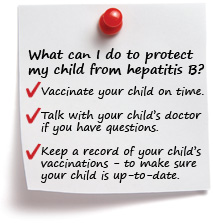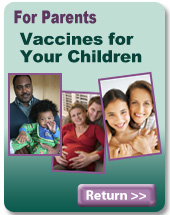Hepatitis B - Fact Sheet for Parents
Diseases and the Vaccines that Prevent Them
Español: Hepatitis B
Printer friendly version[409 KB, 2 pages]
Benefits of hepatitis B vaccine
- Saves lives.
- Protects against serious disease.
- Prevents liver disease and cancer.
- Keeps others safe.
Side effects of the hepatitis B vaccine
The most common side effects are usually mild and include the following:
- Sore arm from the shot in up to 1 out of 4 people.
- Fever of 99.9 degrees or higher in about 1 out of 15 people.
- Tiredness and crankiness in about 1 out of 5 people.
What is hepatitis B?
Hepatitis B is a contagious liver disease that results from infection with the hepatitis B virus. When first infected, a person can develop an “acute” infection, which can range in severity from a very mild illness with few or no symptoms to a serious condition requiring hospitalization. Acute hepatitis B refers to the first 6 months after someone is infected to the hepatitis B virus. Some people are able to fight the infection and clear the virus. For others, the infection remains and is “chronic,” or lifelong. Chronic hepatitis B refers to the infection that occurs when the hepatitis B virus remains in a person’s body. Over time, the infection can cause serious health problems.
What are the symptoms of hepatitis B?
Infants and young children usually show no symptoms.
In about 7 out of 10 older children and adults, short-term hepatitis B causes the following:
- Loss of appetite (not wanting to eat)
- Fever
- Tiredness
- Pain in muscles, joints, and stomach
- Nausea, diarrhea, and vomiting
- Dark urine
- Yellow skin and eyes
Symptoms of short-term illness usually appear 3 or 4 months after infection.
How serious is hepatitis B?
Hepatitis B can be very serious. Most people with short-term hepatitis B may feel sick for a few weeks to a several months. Some people get over the illness. For other people, the virus stays in their body for a life time.
People with lifelong hepatitis B usually don’t have symptoms, but the virus causes liver damage over time. For these people, there is no cure but treatment can help prevent serious problems. Each year, 3,000 to 5,000 people in the U.S. die from liver damage or liver cancer caused by hepatitis B.
How does hepatitis B spread?
Hepatitis B spreads through blood or other body fluids that contain small amounts of blood of an infected person. People can spread the virus even when they have no symptoms.
Babies and children can get hepatitis B in the following ways:
- At birth from their infected mother.
- From bites from an infected person.
- By touching open cuts or sores of an infected person.
- Through sharing toothbrushes or other personal items used by an infected person.
- From food that was chewed (for a baby) by an infected person.
- From ear piercing needles that were not cleaned well.
The virus can live on objects for 7 days or more. Even if you don’t see any blood, there could be virus on an object.
A shot in the first days of life?
It’s hard to imagine putting your newborn through the pain of a shot. But a little stick in the first day of life is an important first step to protecting your baby against a deadly disease.
All babies should get the first shot of hepatitis B vaccine before they leave the hospital. This shot acts as a safety net, reducing the risk of getting the disease from moms or family members who may not know they are infected with hepatitis B. And when a mom has hepatitis B, in addition to the hepatitis B vaccine, the baby should also get the hepatitis B immune globulin (HBIG) within the first 12 hours of life. HBIG is a medicine that gives a baby’s body a “boost” or extra help to fight the virus as soon as he or she is born. The HBIG shot is only given to babies of mothers who have Hepatitis B.
What is the hepatitis B vaccine?
The hepatitis B vaccine protects against getting hepatitis B. It is a copy of only one small part of the virus. The vaccine cannot give the infection. The hepatitis B vaccine protects children by preparing their bodies to fight the virus.
Almost all children (95 children out of 100) who get three to four doses of the vaccine will be protected from hepatitis B.
When should my child get the hepatitis B vaccine?
Children need three to four doses of the hepatitis B vaccine (depending on the brand of vaccine used) at the following ages for best protection:
- The first dose at birth (within 12 hours if the mother has hepatitis B infection);
- A second dose at 1 through 3 months; and
- A third dose at 6 through 18 months of age.
Some children may need a forth dose. Talk to your child’s doctor to find out how many shots your child needs.
Older children who did not get the vaccine as a baby should get it as soon as possible.
Why should my child get the hepatitis B vaccine?
Getting your child the hepatitis B vaccine protects him against serious disease.
Of the more than 1 million people in the United States living with life-long hepatitis B, most got the virus as a child. When infants and young children are infected with hepatitis B, they have a 90% chance of developing a life-long, chronic infection. One out of 4 of these children will have serious liver disease as an adult, including cancer.
Children and adults with life-long hepatitis B can pass on the virus to other people.
 If my child does not get the hepatitis B vaccine, will he get the disease?
If my child does not get the hepatitis B vaccine, will he get the disease?
Children who do not get the vaccine for hepatitis B are at risk for infection. More than 1 million people in the U.S. have life-long hepatitis B. Most don’t know it. Therefore, an unvaccinated child may be at risk of getting the disease from someone who has the virus and doesn’t even know it.
Is the hepatitis B vaccine safe?
The hepatitis B vaccine is very safe, and it is effective at preventing hepatitis B. Vaccines, like any medicine, can have side effects. But no serious side effects are known to be caused by the hepatitis B vaccine.
Most people who get the hepatitis B vaccine will have no side effects at all. Those that do occur are very mild, such as a low fever (less than 101 degrees) or a sore arm from the shot.
Where can I learn more about the hepatitis B vaccine?
To learn more about the hepatitis B vaccine or other vaccines, talk to your child’s doctor.
Call 800-CDC-INFO (800-232-4636) or go to the CDC Vaccines web site and check out the following resources:
Fact Sheets for Parents
Diseases and the Vaccines that Prevent Them
![]() This symbol means you are leaving the CDC.gov Web site. For more information, please see CDC's Exit Notification and Disclaimer policy.
This symbol means you are leaving the CDC.gov Web site. For more information, please see CDC's Exit Notification and Disclaimer policy.
Copyrighted images: Images on this website which are copyrighted were used with permission of the copyright holder and are not in the public domain. CDC has licensed these images for use in the materials provided on this website, and the materials in the form presented on this website may be used without seeking further permission. Any other use of copyrighted images requires permission from the copyright holder.
Contact Us:
- Centers for Disease Control and Prevention
1600 Clifton Rd
Atlanta, GA 30333 - 800-CDC-INFO
(800-232-4636)
TTY: (888) 232-6348 - New Hours of Operation
8am-8pm ET/Monday-Friday
Closed Holidays - cdcinfo@cdc.gov




